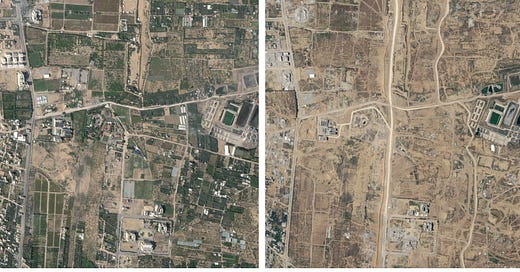The Israel-Hamas Conflict: Inside the Netzarim Corridor
The Complicated Reality of the Israel-Hamas Conflict: A Look at the Netzarim Corridor
A Look at the Netzarim Corridor
The Israel-Hamas conflict continues to intensify, with no immediate resolution in sight. Israel's ongoing fortification of the Netzarim Corridor in Gaza is emblematic of its broader strategy to maintain control and prevent the resurgence of Hamas fighters. This brief article explores what Israel's actions in this strategic corridor indicate about its postwar plans and the potential long-term implications for Gaza.
The Strategic Significance of the Netzarim Corridor
The Netzarim Corridor, a four-mile-long road south of Gaza City, has become a focal point of Israel's military strategy. Stretching from the Israeli border to the Mediterranean Sea, this corridor effectively splits Gaza in two. Satellite imagery and other visual evidence show that Israeli troops are establishing bases, taking over civilian structures, and demolishing homes in this area. Analysts and Israeli experts suggest this is part of a larger project to reshape Gaza and entrench the Israeli military presence.
Israel's Objectives and Military Presence
Despite ongoing cease-fire negotiations, Israel has been fortifying its positions within the corridor. Three forward operating bases have been established since March, indicating a significant military build-up. The corridor's strategic location allows the Israel Defense Forces (IDF) to rapidly deploy troops throughout Gaza, maintain control over aid distribution, and monitor the movement of displaced Palestinians to prevent Hamas from regrouping.
The Impact on Gaza's Infrastructure
The construction of roads, outposts, and buffer zones has led to extensive destruction of residential houses in Gaza. According to Adi Ben-Nun, a geographic data specialist at Hebrew University, at least 750 buildings have been destroyed to create a "buffer zone" on either side of the corridor. This systematic clearing of buildings and agricultural land highlights the scale of Israel's reshaping efforts. The IDF's refusal to comment on these operations underscores the sensitive and controversial nature of its activities in the area.
Historical Context and Future Implications
The Netzarim Corridor's strategic importance is not new. It was part of then-Prime Minister Ariel Sharon's "five fingers" strategy, which aimed to divide Gaza into controllable segments. Although this plan was only partially implemented before Israel's withdrawal in 2005, the current military activities suggest a return to these older strategies.
Prime Minister Benjamin Netanyahu has been vague about his postwar plans for Gaza, but he has consistently emphasized the need for "indefinite" security control over the enclave. This includes conducting future raids and potentially maintaining a permanent military presence to ensure Hamas's demilitarization. The establishment of forward operating bases and infrastructure improvements along the corridor supports this long-term vision.
Humanitarian Concerns and International Response
The international community, including the United Nations, has expressed concern over the humanitarian impact of Israel's actions. The creation of the corridor and the associated destruction have exacerbated the humanitarian crisis in Gaza, leading to widespread displacement and destruction of civilian infrastructure. The blockade on humanitarian convoys and the stringent controls over aid distribution have further intensified the suffering of Gaza's civilian population.
Summing Up: A Complex and Uncertain Future
Israel's fortification of the Netzarim Corridor reveals a strategic intent to maintain a significant military presence in Gaza. While Israel insists it does not intend to reoccupy Gaza permanently, the construction of roads, bases, and buffer zones points to an expanding role for its military. As cease-fire negotiations continue, the future of Gaza remains uncertain, with the potential for prolonged conflict and humanitarian challenges. The international community must remain vigilant and proactive in addressing the complex realities of the Israel-Hamas conflict to ensure a just and lasting resolution.





